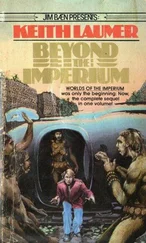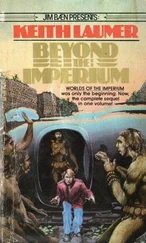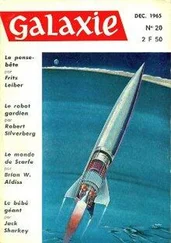Zone Yellow
by Keith Laumer
I decided to walk home from the big affair at the Richtofen palace; it was a mild evening for Stockholm in September, and I needed the exercise. When I turned off Strandvagen to take a shortcut via Styrmansgatan, I heard something behind me. I looked back, not feeling alarm, just mild curiosity. I caught only a glimpse of a tall, oddly narrow-shouldered figure wrapped to the ankles in a drab overcoat, just as he ducked into a side alley. That made me more curious. I went back as if casually, and as I reached the doorway, he literally fell on me. I threw him back and got a glimpse of an ugly, buck-toothed, chinless face just as he fell over sideways, and lay on the cobbles, moving feebly. I realized he really had fallen on me. He was wounded, or sick. I went to one knee to feel for a pulse. What I felt was a wiry wrist with a pelt like a terrier. I rolled him on his back; he had a rank rats-in-the-barn smell to him, plus a stink like rotten oranges. His clothes under the coat consisted of a closely-fitted coverall made of a woolly material. His long, deformed feet were in high-top shoes or low boots of a soft, wrinkled reddish leather. There was short fur on his shins.
His pockets were empty. The hair on the back of my neck was prickling, Nature’s way of making me look bigger, to scare off predators. The rat-man’s beady eyes were open and he was looking at me with an expression which, had he been human, I’d have called appealing. He mumbled something, all vowels and squeaks, ending with a moan. The light went out of the eyes. He was dead. A big, bristly Norway rat came scuttling along the alley, halted, sniffed, started around the dead creature, changed his mind and ran for it. I left the narrow alley and went back out to Strandvagen, where a mercury-vapor lamp shed a ghoulish light on the elegant facades facing the harbor and glittered on the choppy water. I saw a taxi with its cheery orange light on, and started toward it. The time of a leisurely stroll was past. I needed to get to HQ, Kungliga Spionage, ASAP.
When I was ten feet from the taxi, the cabby glanced at me, then gunned away from the curb and left me standing in a cloud of burnt-kerosene fumes. Stockholm’s cabbies are known for their courtesy and helpfulness; something was bothering that fellow. I watched him speed across Gustav-Adolphstorg and into Tunnelgatan.
Just then, two men ran out of another side street. Well-dressed middle-aged Swedes don’t jog around the city streets after dark. But these two were coming at full tilt, and there was another man running behind them, not chasing them, but fleeing from whatever had spooked the first two. Then a whole crowd burst from the narrow street, and I could hear the mob-roar coming from them. Some of them were bleeding from small wounds. They looked like a routed army. They kept coming, right past me, men and women and kids, all running hard, with terrified expressions on their faces. I went out to try to intercept one fellow, but he gave me a wild-eyed look and veered out around me. Over by the stone facade of an eighteenth-century ship’s chandler something caught my eye, standing in a doorway: a tall, narrow figure like a six-foot, dull-olive cigar with feet and a turned-up collar. I felt panic grab at my throat and choked off the yell that I had spontaneously started to utter. Before I could so much as grab somebody and point out the stranger, I saw another one―then another. All three were simply standing in shadowy doorways. They were too tall, too narrow, with only feet showing beneath the long coats, and short, insignificant-looking arms with the hands tucked into high-set pockets. They were exactly like the ratty fellow who’d died in the alley. I didn’t know why, but there was something indescribably ominous about these silent, unmoving fellows.
I stepped into a doorway. The last stragglers of the panicked mob had pushed on by. I looked down the side street they had come from and saw something that made my heart sink: a crowd of the overcoated intruders, coming on at a run, running awkwardly, but amazingly swiftly, leaning forward at a perilous angle, their stubby legs twinkling below their long coat-skirts. One stumbled and fell and the rest flowed over him, leaving a shapeless heap behind. Then one turned back and ran to his fallen comrade and bent over him.
It took me a moment to realize he was eating him.
The last few stragglers―I had stopped thinking of them as men―were having trouble keeping up, and tended to extend their arms and drop to all fours. If they were trying to overtake the mob, they didn’t succeed, but they kept on coming, dozens, scores of them. They streamed past me without noticing me.
Then one fellow dropped out and scuttled over to a fire escape, which he went up, to the first landing, without slowing down. He stopped there and fumbled inside the drab coat and brought out something that I knew at once was a weapon, though it looked more like a wad of wire coathangers. He set himself and aimed it down across the torg, just above the last group of people, and a blue bolt of lightning slammed into the weathered stonework of the building above and ahead of them, and chunks of rock fell in their path, not quite blocking it. The mob skirted the obstruction, leaving behind three casualties writhing on the cobbles.
I eased out my old Walther 6.35, took aim, and put a round into the midsection of the shooter. He doubled over the rail and fell, twisting in midair. He hit hard, but his fellow whatever-they-weres went over or around him and left him there. Suddenly the plaza was empty, except for the casualties.
One of the three people injured by the falling stones had gotten to his feet and was exploring himself to find out how badly he was hurt. I went over to him. He gave me a startled look, but held his ground. He was a sturdy-looking young fellow in what looked to me like shore-clothes. He said, “What the heck!” (Yes, “heck”; Swedes don’t swear much.)
“How badly are you hurt?” I asked him.
He shook his head vaguely. “What happened?” he continued. “I was running―”
“Why?”
“The rat-men,” he said. “Didn’t you see them? Everybody was running and I didn’t have any better idea, so I joined in.” He touched his left arm. “Just a broken arm, it appears,” he diagnosed. He looked at the middle-aged woman and the elderly man lying on the pavement beside us, bloody. Both were dead.
“They weren’t so lucky,” he commented. He glanced at the reddish stone fragments, then looked up at the wound on the store-front. “Artillery fire. Who―?” He broke oif and gave me a hard look. “You’re not running,” he accused. “Friends of yours?”
I knew he meant the rat-men; I denied it, and pointed to the one I’d shot. “He was the one who dropped the rocks on you,” I told him. He nodded and went over toward the dead creature. The light of the street lamps was wan in the colorless stone plaza, surrounded by drab age-worn facades. His feet echoed. Otherwise the silence was complete, except for some yells in the distance. My eye fell on a handbill stuck on the lamppost: Satt in på blodbanken. Du kan sjalv behdver ta ut (Deposit in the bloodbank. You might need to make a withdrawal). That harmless exhortation suddenly had a personal and ominous meaning for me. I went on to where the man with the broken arm was looking down at the dead thing, wrapped in its dowdy coat. He rolled it on its back, or tried to; its long, slinky build wouldn’t let it stay put. It flopped back to its half-curled position on one side.
“This thing is not human,” he remarked, sounding shocked. He flipped the coat open, exposing a sort of body-stocking of the same mousey color as the wool coat. The arms, which we could see clearly now, were abnormally short and stubby, and the hands were like bones covered with pinkish leather, talon-tipped.
Читать дальше












